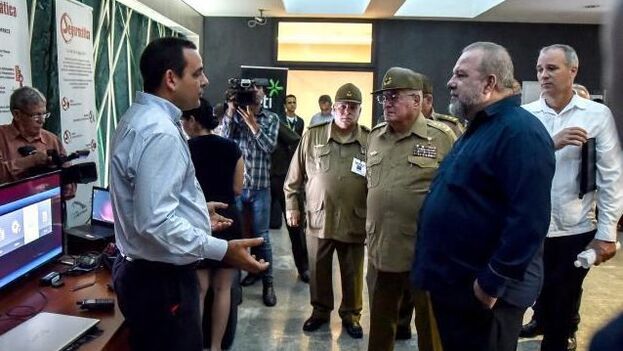
![]() 14ymedio, Havana, 24 November 2022 — Closely monitored by an entourage of the Armed Forces, Manuel Marrero Cruz created a National Working Group for Cybersecurity in Havana on Wednesday. Although the Cuban prime minister avoided mentioning it, this step facilitates the recent alliance of the state communications monopoly, Etecsa, with the military Information Technology Company for Defense, known as Xetid.
14ymedio, Havana, 24 November 2022 — Closely monitored by an entourage of the Armed Forces, Manuel Marrero Cruz created a National Working Group for Cybersecurity in Havana on Wednesday. Although the Cuban prime minister avoided mentioning it, this step facilitates the recent alliance of the state communications monopoly, Etecsa, with the military Information Technology Company for Defense, known as Xetid.
Xetid, founded in 2013 by a group of military computer scientists, is the technological arm of the Armed Forces. With a discreet profile, it focuses on the search for “solutions” to guarantee the effectiveness of the regime in digital surveillance and the development of Defense software, in collaboration with the University of Computer Sciences (UCI).
Xetid is responsible for the design of the EnZona electronic payment application, which requires a large amount of private information from users before allowing them to access their profile, in addition to monitoring their transactions.
Etecsa’s pact with Xetid allows the Government to unify the databases of both companies and to amplify, with the direct supervision of the Armed Forces, their control over users. Among the terms of the alliance is the joint management of EnZona and Transfermovil, created by Etecsa to guarantee the flow of telephone recharges from abroad, among other operations.
The directors of both corporations affirm that the pact aims to “make life easier for Cubans in the digital area” and invites users to trust the transactions that are made with both applications.
In addition, it allows Etecsa “to have access to Xetid’s software tools related to industry 4.0, business management and e-government, the main lines of the organization along with automation and security,” according to Cubadebate.
During the opening of the first workshop on cybersecurity, organized at the José Antonio Echevarría Technological University of Havana, Marrero Cruz applauded this alliance and pointed out that cyberspace surveillance is “a priority” of the Government.
The “identification and elimination of security breaches” was one of the concerns of the prime minister, who read his speech in the presence of a watchful minister of the Armed Forces, Álvaro López Miera, and his military group.
Marrero Cruz avoided departing from the script provided in his speech, and when he did it was to nervously mention the 11J protests, which he attributed to an “offensive” from the United States. “Let’s not forget that the US created the Internet Working Group for Cuba in 2018 with the aspiration that social networks become subversion channels,” he said, not without first describing as victims official portals “such as the Presidency, Granma, Cubadebate and the Government,” in the sights of “media bombing” from abroad.
After the speech, the companies participating in the workshop showed Minister of the Armed Forces Marrero Cruz and other military and officials several surveillance items like security cameras, identification mechanisms, alarms and defensive-use software.
Marrero didn’t specify what the functions of the National Working Group for Cybersecurity would be, although he did point out that it would operate under the direction of the President of the National Defence Council, a position held by President Miguel Díaz-Canel.
Translated by Regina Anavy
____________
COLLABORATE WITH OUR WORK: The 14ymedio team is committed to practicing serious journalism that reflects Cuba’s reality in all its depth. Thank you for joining us on this long journey. We invite you to continue supporting us by becoming a member of 14ymedio now. Together we can continue transforming journalism in Cuba.
